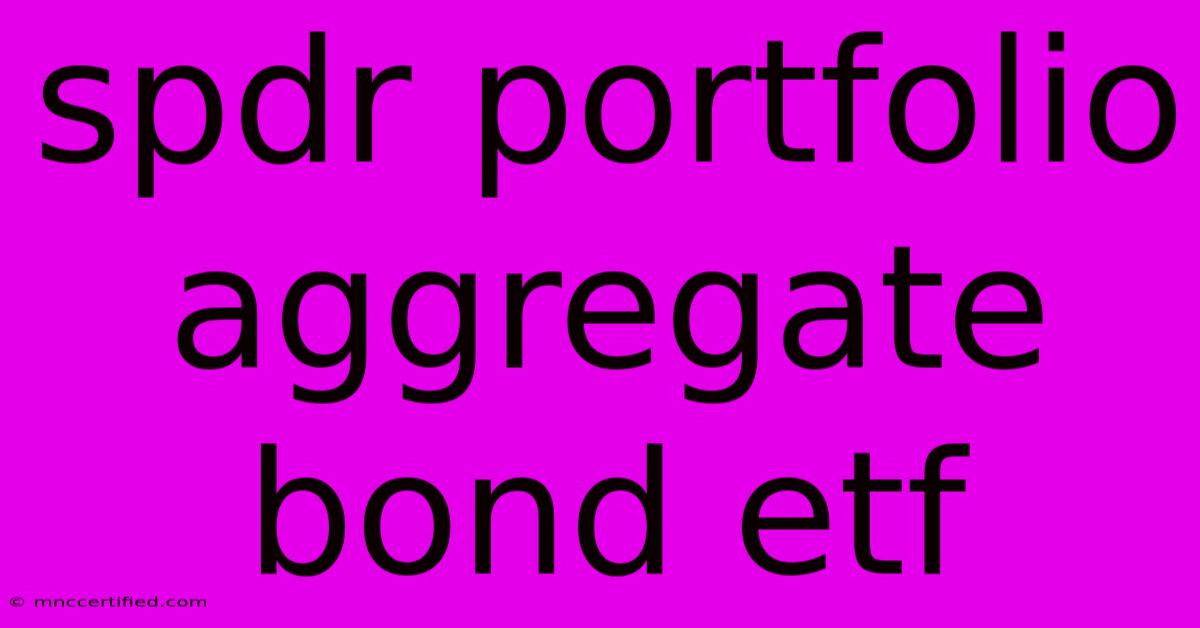Spdr Portfolio Aggregate Bond Etf

Table of Contents
SPDR Portfolio Aggregate Bond ETF: A Deep Dive for Investors
The investment world offers a vast landscape of options, and choosing the right vehicle can be daunting. For investors seeking diversified exposure to the U.S. investment-grade bond market, the SPDR Portfolio Aggregate Bond ETF (AGG) stands as a prominent choice. This article will delve into the intricacies of AGG, exploring its features, benefits, risks, and suitability for various investment strategies.
Understanding the SPDR Portfolio Aggregate Bond ETF (AGG)
The AGG ETF tracks the Bloomberg U.S. Aggregate Bond Index, a widely recognized benchmark representing a broad spectrum of U.S. investment-grade bonds. This includes government bonds, corporate bonds, mortgage-backed securities, and other investment-grade debt instruments. The sheer breadth of this index makes AGG a compelling option for investors aiming for diversification within the fixed-income asset class.
Key Features of AGG:
- Diversification: AGG's exposure to various bond types minimizes risk associated with holding a single type of bond. This diversification is a significant advantage, particularly during periods of market volatility.
- Low Expense Ratio: AGG boasts a remarkably low expense ratio, making it a cost-effective way to gain exposure to the investment-grade bond market. Lower expenses translate directly into higher returns for investors over the long term.
- Liquidity: As one of the largest and most actively traded bond ETFs, AGG offers excellent liquidity. This ensures that investors can easily buy and sell shares without significant price slippage.
- Tax Efficiency: The ETF structure of AGG generally leads to more tax-efficient distributions compared to actively managed bond funds.
Benefits of Investing in AGG
Investing in AGG offers several key benefits:
- Reduced Risk Through Diversification: As mentioned, AGG's broad diversification across various bond sectors significantly lowers the overall portfolio risk. This is especially important for risk-averse investors.
- Access to a Wide Range of Bonds: Gaining exposure to a diverse range of investment-grade bonds would typically require significant capital and expertise. AGG provides this access conveniently and affordably.
- Simplicity and Transparency: AGG's passively managed nature, tracking a well-defined index, offers transparency and ease of understanding for investors.
- Potential for Income Generation: AGG generates income through interest payments from the underlying bonds, providing a steady stream of cash flow for investors.
Risks Associated with AGG
While AGG offers substantial benefits, it's crucial to acknowledge potential risks:
- Interest Rate Risk: Bond prices are inversely related to interest rates. Rising interest rates can lead to a decline in the value of AGG's holdings.
- Inflation Risk: High inflation erodes the purchasing power of fixed-income investments, impacting the real return on AGG.
- Credit Risk: Although AGG primarily holds investment-grade bonds, there's still a risk of default by the issuers, although this risk is generally considered low.
- Market Risk: Like any investment, AGG is subject to broader market fluctuations, although generally less volatile than equity markets.
AGG vs. Other Bond ETFs: A Comparison
AGG often gets compared to other bond ETFs. While a direct comparison requires considering specific investment goals and risk tolerance, key differentiators include the index tracked (AGG tracks the Bloomberg U.S. Aggregate Bond Index, while others might focus on specific sectors like corporates or municipals) and the expense ratio. Researching competitor ETFs is vital before making an investment decision.
Is AGG Right for You?
The suitability of AGG depends on your individual circumstances and investment objectives. Consider these factors:
- Investment Time Horizon: AGG is generally considered more suitable for longer-term investors due to the potential impact of interest rate fluctuations.
- Risk Tolerance: AGG is considered relatively low-risk compared to equity investments, but interest rate risk still exists.
- Investment Goals: If you aim for diversification within a fixed-income portfolio and income generation, AGG might be a suitable choice.
Disclaimer: This article provides general information and should not be considered financial advice. Consult with a qualified financial advisor before making any investment decisions.
Keywords: SPDR Portfolio Aggregate Bond ETF, AGG ETF, Bond ETF, Investment-Grade Bonds, Bloomberg U.S. Aggregate Bond Index, Fixed Income, Diversification, Low Expense Ratio, Interest Rate Risk, Inflation Risk, Passive Investing, ETF Investing
This article incorporates various SEO techniques including keyword optimization (natural keyword placement throughout the text), header usage for structure and readability, and clear and concise language to improve search engine rankings. Remember to perform additional off-page SEO such as link building to reputable financial websites to further boost the article's visibility.

Thank you for visiting our website wich cover about Spdr Portfolio Aggregate Bond Etf. We hope the information provided has been useful to you. Feel free to contact us if you have any questions or need further assistance. See you next time and dont miss to bookmark.
Featured Posts
-
I M A Celebrity 2024 Start Time Tonight
Nov 18, 2024
-
Monday Snow Warning Arctic Blast Hits Glasgow
Nov 18, 2024
-
Corgi Aston Martin Db5 James Bond
Nov 18, 2024
-
James Bond Original Movie Posters
Nov 18, 2024
-
20 19 Packers Victory Bears Game Recap Nov 17
Nov 18, 2024